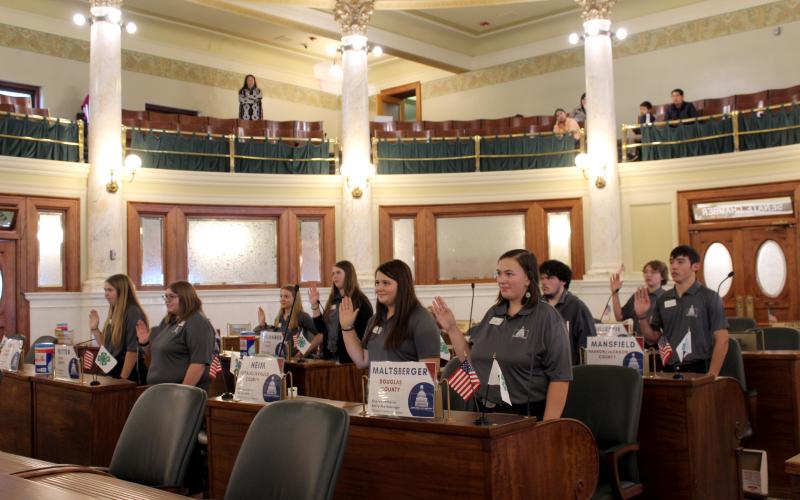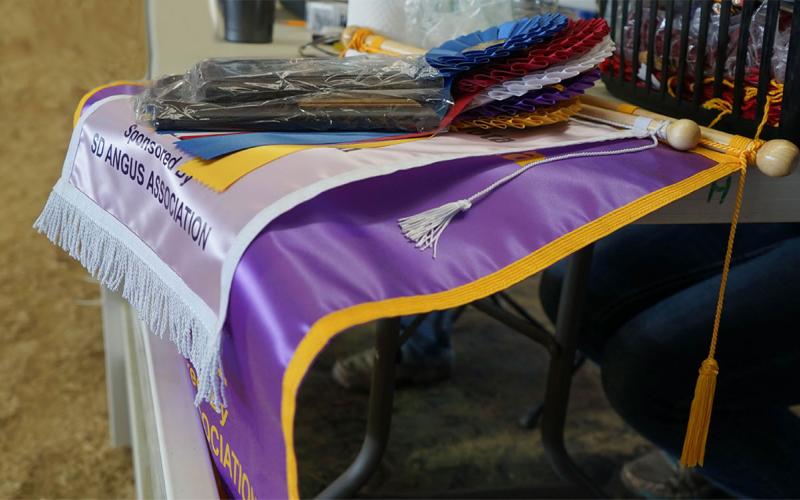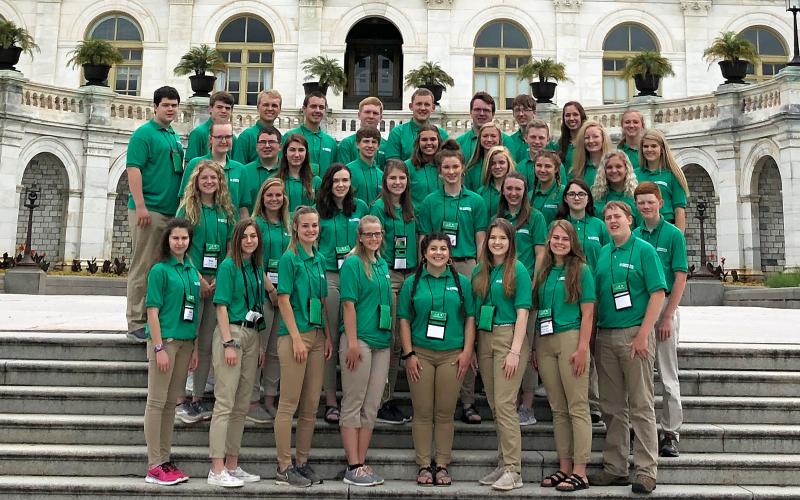This overview is the starting point for general program policies and procedures. It is supplemented by more specific policies and procedures in areas of determined need (see additional web pages). If you cannot find a guideline you seek, please contact your county 4-H office for additional support.
The guidelines established in this, and subsequent documents help South Dakota 4-H achieve our educational mission of positive youth development. This mission is enhanced by serving all eligible youth through our commitment to equal opportunity.
Authority
Legal authority for the South Dakota 4-H program rests with the Director of South Dakota State University Extension within the College of Agriculture, Food and Environmental Sciences and is generally designated to the SDSU Extension State 4-H Program Director. The Program Director is the authorized entity for establishing and maintaining policies, procedure, guidelines, and forms for South Dakota 4-H.
Local 4-H professional(s) guide the county 4-H program. These professionals receive local assistance from 4-H leader’s associations, volunteers, clubs, and other supportive entities as well as professional support from their 4-H regional youth educator. County 4-H programs and authorized 4-H entities may establish local policies, procedure, guidelines, and forms in support of local 4-H efforts as long as they do not contradict the state 4-H standards. No county 4-H policies, procedure, guidelines, and forms may conflict with state 4-H or federal guidelines and requirements, and the SDSU Extension State 4-H Program Director shall be notified of any local 4-H policies, procedure, guidelines, and forms that does not positively advance our mission of positive youth development. The Program Director is authorized to address these concerns as needed.
Disclaimer
South Dakota 4-H prepared this overview for your information only. Nothing presented constitutes an expressed or implied contract, a warranty of any benefit, or a guarantee of status for any period. South Dakota 4-H reserves the right to revise, add to, or delete any policies, procedure, guidelines, and forms at any time it deems appropriate, in its sole and absolute discretion, with or without prior notice or publication.
Equal Opportunity
By law, programs financed with public funds seek ways to regularly and consciously include people. 4-H representatives must ensure that 4-H programs are open to those who desire to participate. 4-H representatives must use and document reasonable efforts to make individuals aware of program opportunities. Appropriate documentation of these efforts should be maintained on file in the county office. County programs are subject to audits.
It is acceptable to have requirements for participation in certain activities, but the requirements must be reasonable. Requirements may not be based on the protected classes, except in cases approved by the SDSU Extension State 4-H Program Director or outlined in existing policy guidance (e.g., age-based safety standards). The goal of equal opportunity is to make sure programs are delivered equitably to the people who have funded them – the public.
Mission and Vision
Mission: South Dakota 4-H engages all youth in place-based positive youth development.
Tell Me More: Positive youth development is the transformation of all children into well-adjusted young adults through beneficial experiences, activities, and relationships. Place-based education means we are committed to developing young people in ways that strengthen ties to local communities and reduce outmigration.
Vision: Through experiential learning and mentoring relationships, South Dakota 4-H prepares youth to lead lives of possibility amidst the grand challenges of our time.
Membership and Participation
The 4-H Year
From a membership and scheduling perspective, South Dakota 4-H begins each year on October 1. Enrollment or re-enrollment is open all year, but youth members must enroll before June to gain credit for that year. Some event deadlines come earlier.
Initial Eligibility
South Dakota 4-H is open to all youth ages 5-18 based on a January 1 birthday cycle.
- Explanation example: If a youth turns 5 on January 1st, s/he becomes eligible for 4-H membership on the forthcoming October 1 whereas if a youth turns 5 on December 31st, s/he is already eligible for 4-H membership.
Youth with special needs may participate for a total of 14 years using age equivalencies that best support their developmental goals, provided they are still enrolled in a high school special education program or equivalent.
Maintaining Eligibility
Enrolled member participation is considered year-to-year. All appropriately aged youth maintain eligibility so long as a) they are not currently under the discipline of the Code of Conduct Policy and Member Behavior Expectations, and b) they choose to re-enroll. Participating youth who are not enrolled members are bound by these expectations even when participating as an outreach member. See below for full text.
The South Dakota 4-H Program expects youth members and participants to behave in an acceptable manner at all events and activities in accordance with the South Dakota 4-H Member Behavior Expectations and the Code of Conduct Policy.
Member Behavior Expectations
South Dakota 4-H is designed to provide youth of all ages with a positive environment in which to learn and grow. It also provides opportunities for children and youth to build positive traits of character. South Dakota 4-H supports the six Character Counts’ pillars of character: Trustworthiness, Respect, Responsibility, Fairness, Caring and Citizenship. To ensure that all youth have equal access to positive learning environments, South Dakota 4-H members and participants agree to abide by these expectations of behavior:
- I will be trustworthy.
I will be worthy of trust, honor, and confidence. I will be a good role model by doing the right thing at all times. I will be honest in all of my activities. I will be on time for all scheduled events and will attend all of the planned activities. If I am not feeling well or have a schedule conflict, I will inform my chaperone or a person in charge of the event before the activity starts. I will be in the assigned area (club meeting room, building, dorm, etc.) at all times. South Dakota 4-H will not permit dishonesty such as lying or cheating. - I will be respectful.
I will show respect, courtesy, and consideration to everyone, including myself, other participants, and those in authority. I will act and speak respectfully. I will treat meeting rooms, lodging areas, personal property, and transportation vehicles with respect. I will follow all published dress code guidelines for the event and/or activity. I will respect the personal space and choices of other participants and will not participate in inappropriate displays of affection or physical contact. I will not use vulgar or abusive language, cause physical or emotional harm, or create a feeling of fear amongst other participants. - I will be responsible.
I will be responsible and accountable for my choices and my actions towards myself and other people. I will follow all rules and guidelines established for the activity or event. I will follow the verbal instructions issued by SDSU Extension staff, chaperones, and/or adult volunteers. I will abide by the established program curfew. I will be responsible for any damage, theft, or misconduct that I am involved in or cause. - I will be fair.
I will participate in events fairly by following the rules, not taking advantage of others or ‘gray areas,’ and not asking for special help or favors. - I will be caring.
I will be caring in my relationship with others. I will be kind and show compassion for others. I will treat others the way I want to be treated. I will show appreciation for the efforts of others. I will include all participants in activities and will try to help everyone be involved in the scheduled activities. - I will be a good citizen.
I will be a contributing and law-abiding citizen. I will be respectful to the environment. I will not use illegal substances such as tobacco, alcohol, or drugs or be involved in the use or possession of weapons or fireworks. If I am found to have any of these items with me or if I have taken any illegal substances, adult staff/volunteers will notify law enforcement.
Code of Conduct Policy
If I do not abide by the items in the Member Behavior Expectations above, I will experience the following consequences in the order listed:
- The loss of rights and privileges at the event/activity.
- Dismissal from the event/activity with an adult staff member or chaperone/volunteer notifying my guardians and that I must go home at my family's expense before the event/activity ends.
- The possible forfeiture of future participation in statewide and out-of-state events/activities as well as the forfeiture of future awards and premiums at the county level for a period of time up to one year. If this step is considered necessary, county staff will consult with the appropriate state staff member and will coordinate the decision with support from the parents/guardians of the involved 4-H member(s).
Membership Types
There are two membership types in South Dakota 4-H —outreach or enrolled.
- Outreach members do not formally enroll in 4-H but are generally served through in-school, afterschool, or short-term 4-H activities.
- Enrolled members sign up annually (after October 1 but before June 1) in our online member system and are either independent or club members. Independent members pursue their 4-H projects and activities independently and connect at the county/regional/state level(s) for social development opportunities. Club members are connected to a community or special interest club.
- Community clubs are generally organized based on geography. Youth in these clubs take a variety of projects, perform demonstrations, exercise leadership, join together in community service, and more.
- Special interest (SpIn) clubs are organized for a specific topic of interest (e.g., equine, STEM, shooting sports). Though some SpIn clubs offer a few opportunities in leadership development and community engagement, their primary focus is bringing youth together who have a shared topical interest.
Did you know?
Each year 4-H serves 26% of eligible youth in South Dakota, one of the highest participation rates in the nation. Nationwide, nearly 6 million youth participate in 4-H activities each year!
Note: On a 4-H County Impact Snapshot, you may notice a third membership category labeled ‘mastery members.’ This is not something youth choose; rather, it serves as an end-of-year reporting tier by county 4-H staff as they measure the depth of the county program.
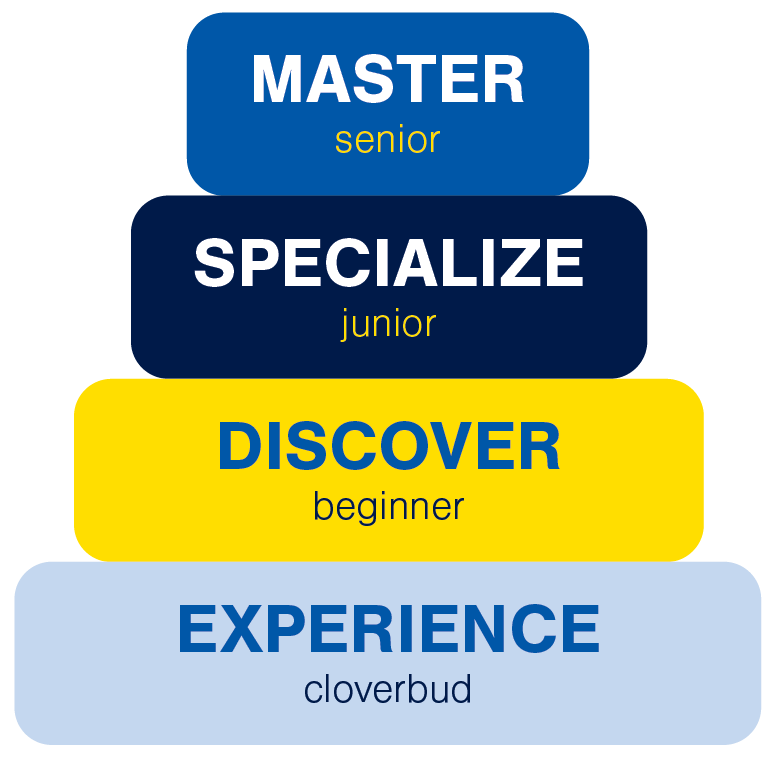
4-H Ages for Enrolled Members
- Ages 14-18 are Senior members. Seniors specialize in a few projects of interest and ‘dive deep.’ They may take on advanced leadership roles throughout the state and serve as important role models and guides for younger members. They keep building readiness skills that will prepare them for life and work. This is an era in which youth grow from specialization toward mastery.
- Ages 11-13 are Junior members. Juniors begin to refine their 4-H interests and add depth to project learning. They may begin to take on leadership roles at the local level. This is an era in which you grow from discovery toward specialization.
- Ages 8-10 are Beginner members. Beginners often try out a number of 4-H activities and projects. This is an era of discovery.
- Ages 5-7 are Cloverbud members. Cloverbuds participate in non-competitive, social experiences. Cloverbuds are not permitted to participate in large animal, equine, or shooting sports activities. They do not complete judged projects; rather, the focus is connective experiences with other youth and caring mentors.
Cross-state or Cross-county Participation
Youth from out-of-state may participate as full members in only one state’s 4-H program but may have dual membership and cross state lines for specialized, non-duplicative topics of interest (e.g., virtual programs, Shooting Sports disciplines not offered in their home area). Youth may not participate across state lines for perceived competitive advantage, including the chance to complete the same project twice in two locations. 4-H staff from both locations must be informed prior to participation and their eligibility decisions are final.
South Dakota youth may participate in more than one county following the same general guidance as above.
Membership
Youth transferring membership during the same 4-H year from one county to another or another state 4-H program to South Dakota 4-H are immediately eligible to participate in county 4-H events and programs unless an essential qualifying element has been missed. The 4-H family should notify their incoming county 4-H professional of the change of residency as soon as possible. Both the incoming and outgoing county 4-H professionals will discuss the transfer to ensure competitive advantage or evading disciplinary measures are not the reason for membership transfer—these are not allowed.
Reasonable Accommodation for Participants with Disabilities
By statute and by choice, South Dakota 4-H is committed to serving all youth, including those with disabilities. Whether the disability is short or long-term, providing reasonable accommodation can help youth with disabilities experience a more vibrant childhood.
Once a reasonable accommodation request is made, county 4-H professionals are encouraged to work alongside the requesting youth/family to design a suitable plan. Common 4-H accommodations include: supplemental judging format, equipment modification, speech/language assistance, and improved accessibility. Any costs associated with accommodation are first borne by the entity receiving the request and then scale higher within the organization if needed.
On occasion, an accommodation request is considered unreasonable. Here are the three unreasonable request categories:
- The accommodation would create a direct threat to the health and safety of others.
- The accommodation would result in a substantial change in an essential element of the curriculum or a substantial alteration in the manner in which an experience is provided.
- The accommodation would result in an undue financial burden.
Though it may take some creative thinking and adjustment, most accommodation requests in 4-H are reasonable. Any denials of an accommodation request must be discussed with the Program Director prior to making the denial. Additional context and details are available from Disability Services at the South Dakota State University Office of Multicultural Affairs and Accessibility.
Participation by Married Youth
Married members may continue their membership until they age out. Married members are eligible for state and national awards, scholarships, leadership positions, and trips. On overnight trips, married members must follow established travel guidelines just like non-married youth.
Gender and Competition
South Dakota 4-H competitions are considered co-educational.
Event Registration
Event registration is not the same as membership enrollment. Almost every county and state 4-H event has a separate registration process. Members should stay informed of these event and registration requirements via county 4-H communications and the state extension 4-H website.
Administration of Rules and Regulations
South Dakota 4-H reserves the final and absolute right to interpret event schedules, rules and regulations and to arbitrarily settle and determine all matters, questions and differences in regard thereto, or otherwise arising out of or connected with or incident to the event, and the right to amend or add to these rules at any time as its judgment may determine. South Dakota 4-H makes no guarantees as to the fairness or perceived fairness of competitive 4-H activities.
Recognition
South Dakota 4-H modestly recognizes achievement during some of its competitive events. Awards and recognition are aligned with mission priorities and funding availability. Previous award levels are no guarantee of future award levels. In most cases, recognition is limited to the ribbon system based on the excellence level of the project or presentation. Superior/great (purple), excellent/good (blue), average/okay (red), room for improvement (white), and participation/cloverbud (green) are the common ribbon designations.
Recognition for state-level competitive events is considered unofficial for a period of two weeks after the event’s completion (or longer in cases where drug or DNA testing results are awaiting confirmation). This unofficial period is a time for errors to be noted and corrected. Once published results are made official, any further noticed errors may be acknowledged by event leadership but are not eligible for correction.
Ancillary Benefits
Experiential education is the stated purpose of 4-H activities, including competitions. South Dakota 4-H makes no assurances, stated or implied, of any ancillary benefits derived from participation (e.g., prizes, awards, eligibility for awards, publicity, future livestock sales).
Name and Emblem
The 4-H name and emblem (i.e., clover) have historically been protected by federal statute 18 U.S.C. 707. Specific guidelines govern the use of the 4-H name and emblem.
In general, most usage issues can be avoided if attention is given to the following:
- Only use the name/emblem as an authorized entity (e.g., chartered club) for a
4-H purpose. - Use the name 4-H instead of 4H or 4h. Exception: social media hashtags like #4hbeyondready
- Make sure the clover is at least one inch square and facing the right direction.
- Keep the clover clean (i.e., no words running through it) and relatively uncrowded by text or images.
- Receive proper permission before using the 4-H name/emblem in a fundraiser, building, etc.
This
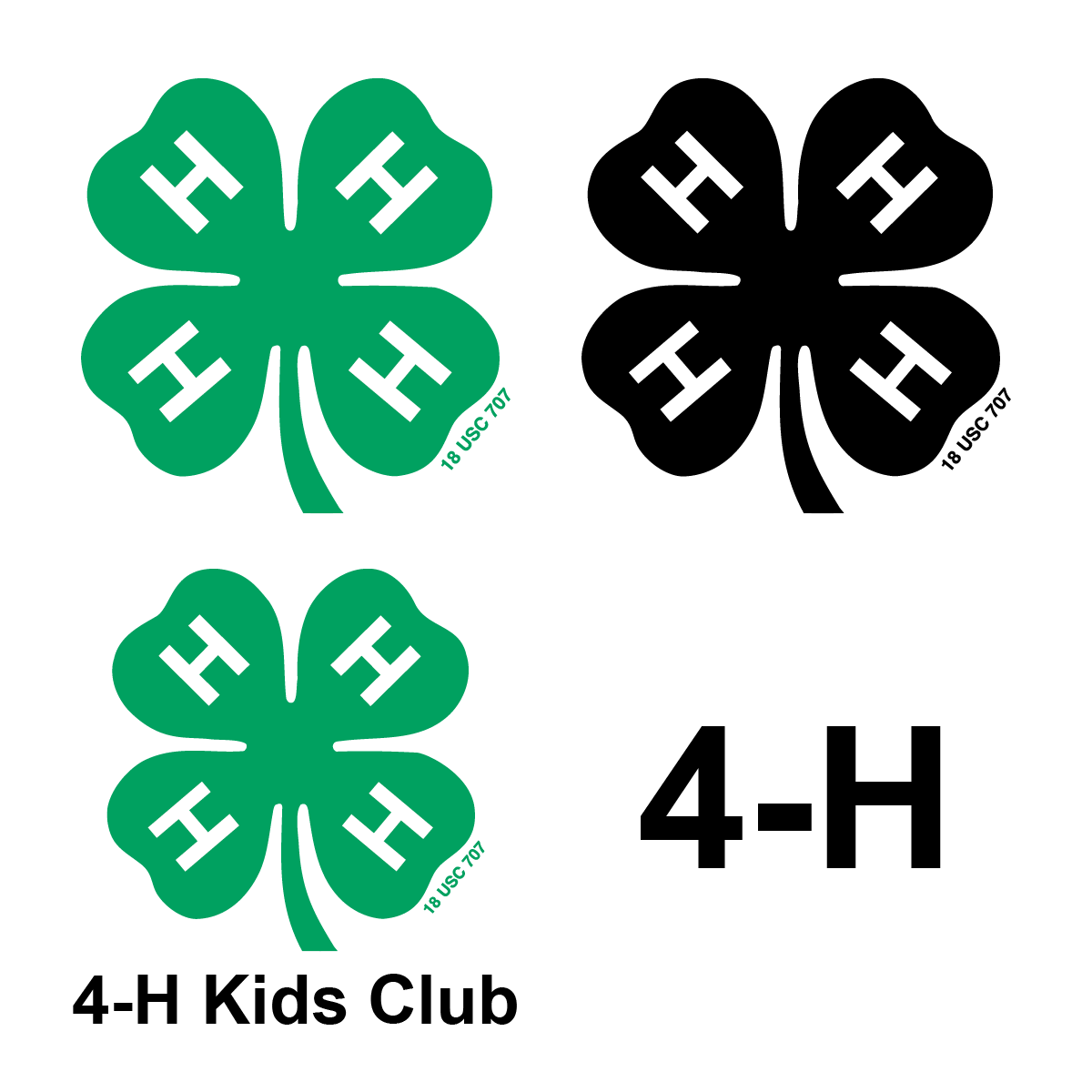
Not This
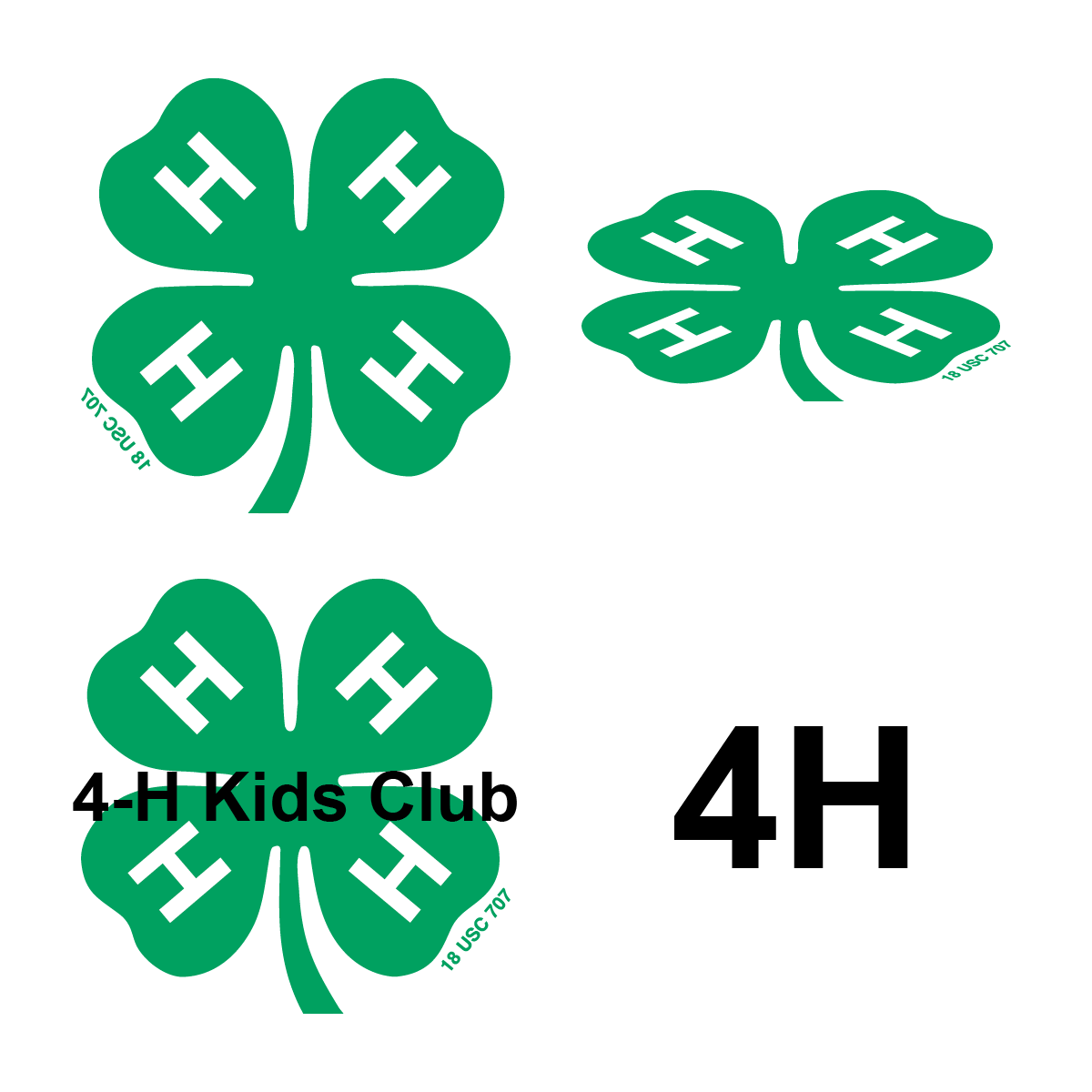
Protection of Minors and Program Safety
Research tells us that youth who experience fear in learning environments do not have the positive outcomes we hope they achieve; therefore, participant safety is foundational to South Dakota 4-H’s mission of positive youth development. The following elements help us attain safer learning environments for 4-H youth:
- Caring adult mentors—all 4-H professionals and certified volunteers receive an interview and background check prior to receiving permission to work with youth is less supervised settings. These certified individuals receive required onboarding training and then are offered ongoing training in topics like risk management, child development theory, positive youth development, skill-building, and more.
- Good behavior—is our expectation for youth, volunteers, and attendees. Youth and volunteers agree to these terms annually whereas general attendees, parents, etc. comply with the expectations outlined in Guardians, Visitors, or Adult Participants Code of Conduct.
- Livestock Integrity Pledge—youth with livestock projects agree to these terms annually which ensures appropriate care for animals and healthy competition; the Pledge enshrines 4-H’s spirit of ‘co-opetition’ in livestock shows.
- Event starts—4-H events generally begin with the 4-H pledge and pledge of allegiance (or sometimes the national anthem in the case of larger public events). Starting this way focuses youth on their commitment to one another and their communities.
- ‘Designed in’ safety—4-H activities are designed with safety in mind. Though we still have tons of fun, youth appreciate that our activities are well planned and orderly. This reduces anxiety and chaos in the learning process.
In addition, several ‘big picture’ safety elements help lower risk within the South Dakota 4-H program for youth or the program itself. Many of these items (e.g., travel and overnight trip safety) are covered in significant detail in other policies and guides. Less detailed items are covered in the upcoming sub-sections.
Mandatory Reporting
Actions against children that lead to or contribute to abuse or neglect are contrary to 4-H values. Such actions are inappropriate in any setting, especially where children and youth are concerned. All reasonable effort is made to comply with State of South Dakota statutes and SDSU guidelines if abuse or neglect is suspected.
4-H representatives (staff and volunteers) will report incidents of suspected abuse or neglect to the following individuals:
- SDSU Extension State 4-H Program Director
- The state’s attorney of the county in which the child resides or is present
- South Dakota Dept. of Social Services (CPS hotline is 877-244-0864)
Contact law enforcement if the child or youth is in immediate danger.
Personal Data and Images
SDSU Extension 4-H Youth Development Program protects the confidentiality of the names and personal information of 4-H members and volunteers. No commercial or unauthorized use is made of names, addresses, and other confidential information of its members. Access to this information is strictly limited to SDSU Extension on password protected devices.
To safeguard the identity of 4-H program participants, South Dakota 4-H does not release the name, address, phone number, or email of participants outside of SDSU Extension unless authorized by the Program Director. All participant contact information for a specific 4-H activity or event is kept confidential by event organizers or the county or state office. This information cannot be released without parental permission. This permission is obtained at the time the youth enrolls in the 4-H program; parents may contact their county office after enrollment if they wish to opt out.
South Dakota 4-H uses the internet and social media as means of distributing information and providing recognition. In the interest of safety, we must do this in a responsible manner as follows:
- Any picture of an individual in which the person can be identified with normal vision acuity can be reproduced only with the individual’s permission. This permission is obtained at the time the youth enrolls in the 4-H program.
- In general, any media/press release generated by 4-H may include the participant’s name, age division (not age), and 4-H county. For example, this is common practice when listing results after a contest. Other details may be listed if part of a parent pre-approved featurette article.
Online Learning
The majority of South Dakota 4-H activities are conducted in-person. On occasion (or during public health emergencies), online learning activities and meetings compliment these efforts. The Member Behavior Expectations and Code of Conduct Policy guide youth behavior in these environments.
Social Media
Overall, research demonstrates that social media is a net negative for society, especially children and youth. As a result, South Dakota 4-H uses social media on a limited basis to supplement other modes of informing the public. When representing the 4-H program on social media, all staff, volunteers, and members are expected to engage in a positive manner. When confrontations inevitably arise, take it offline or ignore; pursuing it further online simply encourages the poor behavior.
Use of Artificial Intelligence (AI)
South Dakota 4-H values the original work and creativity of our youth, so we take a balanced approach to the use of AI for member project completion. Youth may use AI as an idea starter or as a reference gathering aggregator. Youth may not use AI (in part or whole) to complete the project or project paperwork unless required by the project guidelines (e.g., the National 4-H AI Community Challenge).
Insurance for Volunteers and Staff
- South Dakota 4-H provides a secondary liability insurance policy for certified volunteers. This liability policy applies to volunteers while serving within their established position description and expectations.
- The State of South Dakota provides PEPL coverage to SDSU 4-H employees acting within their established position descriptions and expectations.
Accident Insurance for Members
- Enrolled 4-H members either document their personal insurance coverage or purchase a basic accident insurance policy through the county office on an annual basis. This coverage generally costs $3 or less for most members.
- Note: Some counties (or a supporting entity within the county) purchase blanket coverage for all enrolled 4-H members.
- 4-H members enrolled in the 4-H Horse Project and/or 4-H Rodeo pay a higher amount for insurance coverage due to the increased risk profile of those activities. Contact the county office for current insurance information.
- The sponsoring 4-H entity is responsible for purchasing Special Activities Coverage for any outreach 4-H events not otherwise covered by the event/activity partner (e.g., public school).
- To be clear, this is only for outreach events. Events comprised mainly of enrolled 4-H members, families, and observers do not need this coverage.
Safety in Higher Risk Activities
- Equine and/or Rodeo Safety
- Equine/rodeo project or activity participants complete an approved Youth Horse Literacy training annually by the established deadline.
- Equine and rodeo exhibitors are encouraged to wear a helmet in all disciplines. It is a requirement in specific rodeo disciplines.
- 4-H equine representatives and participants should know their responsibilities under South Dakota Codified Law 42-11: Recreation and Sports—Equine Activities. Specifically, equine activity locations should post and maintain the following signage in accordance with § 42-11-2:
WARNING
Under South Dakota law, an equine professional is not liable for an injury to or the death of a participant in equine activities resulting from the inherent risks of equine activities, pursuant to § 42-11-2.
- Livestock Safety
- Livestock project or activity participants complete an approved Youth Livestock Literacy training annually by the established deadline.
- Shooting Sports Safety
- Youth may participate in an organized 4-H Shooting Sports activity only when a certified 4-H Shooting Sports volunteer is present and providing supervision.
- An emergency plan of action is reviewed annually and followed for each training site, facility and activity including:
- Potential risks analyzed and procedures planned
- Minor incidents/first aid, including first aid kits and medically responsible adult
- Access to emergency medical treatment, including location of telephones, list of emergency numbers, access to transportation
- Natural catastrophe procedure, including fire, tornado, lighting
- A copy of the Emergency Plan should be kept in the county office with a copy being sent to the South Dakota 4-H Field Specialist for Shooting Sports and Safety.
- Camping
- The staff resource document ‘Camp Policies and Procedures’ assists 4-H professionals in conducting safe, meaningful camping experiences. This document provides standards for staffing, facilities, health care, operations, programming, and emergency management.
- Waiver of Liability
- Enrolled members sign this annually. Non-enrolled members who participate in a short-term event (e.g., camp) will sign the waiver during event enrollment.
External Marketing
4-H professionals will not broadly share external marketing resources on behalf of private businesses* (e.g., sale flyers, show judges, discounts) such as through a listserv or social media post. If individuals contact the county office and make a specific request for an external resource, 4-H professionals are permitted to share available information (without endorsement). There may also be a public bulletin board (such as in a hallway outside the county office) where these postings may be placed—if so, be sure the disclaimer language below is prominently posted.
*Exception: Several businesses (e.g., Tractor Supply Company) have official partnerships with National 4-H Council. Sharing information on their 4-H fundraising events is permitted.
4-H professionals may broadly share external non-profit resources if they align with 4-H’s educational mission of positive youth development (e.g., American Camping Association tips for first-time campers). When sharing this type of resource, the following disclaimer must be included:
- Disclaimer: This [event/resource/activity] is not a 4-H [event/resource/activity]. We are sharing this information as a convenience, not as an endorsement by South Dakota 4-H.
Fundraising
Only raise funds in support of 4-H’s educational mission of positive youth development. Funds raised should be for current or planned use. 4-H entities should consider how fundraising type affects the reputation of 4-H. It is best practice to employ fundraisers that allow for youth involvement. A few policy notes:
- ‘Labor for hire’ auctions or their likeness are not permitted.
- Raffles, lotteries, and games of chance are discouraged. If pursued, a) the entity is responsible for complying will all applicable South Dakota state gaming laws and tax implications and b) no 4-H representatives may be compelled to attend/support. Importantly, minor youth may not participate in games of chance.
- Food stands and sales shall comply with all applicable South Dakota state health laws.
- Youth doing door-to-door sales should be accompanied by their adult.
- 4-H entities are discouraged from fundraising on behalf of another entity. If pursued, the other entity must align with 4-H’s mission and not violate equal opportunity requirements.
The Word 'Encourage'
In closing, an important note about the word ‘encourage.’ You will encounter this word frequently throughout 4-H documents and conversations. What does it mean? What are we really trying to say when we use the word encourage?
Think of it this way. South Dakota 4-H is a wonderful, but lean system of helping youth develop to their fullest potential. Some smaller counties only have one staff member and a handful of volunteers. This leanness makes it difficult to require everything we wish to require; we simply do not have the enforcement capabilities. Additionally, we desire to see youth exercise a high level of personal responsibility and provide them with the latitude to make good choices. That is both the 4-H and South Dakota way! All these factors taken together, South Dakota 4-H frequently uses the word encourage rather than require.
Unfortunately, a few 4-H participants (usually the adults that surround them) enjoy looking for loopholes/gray areas, using the faults of others to justify their own actions, or crying Pollyanna. They justify their actions by saying things like: ‘this is what it takes to compete.’ No! Stop it. That is not who we are. That is not who we want our 4-H youth to become.
4-H serves youth who value their sense of place, serving others, and contributing meaningfully to community. We are a safe and fun learning lab for life—a place where youth come together to learn new readiness skills, connect with a variety of others, and develop character attributes that will last a lifetime. By contributing to a 4-H community, youth learn to build strong local communities as adults.
So, what do we mean when we use the word ‘encourage’ in South Dakota 4-H? Simply this: Do the right thing, every time.
- When we encourage livestock participants to fit/groom their own animals, we value how learning by doing builds new skills and personal ownership of the eventual outcome. We want youth to be fully involved in the project. What skill is gained by paying a hired hand to make your project perfect for you?
- When we encourage a 15-year-old to try a new leadership opportunity that might feel like a bit of a stretch at the time, we know the value of scaffolded learning whereby youth grow into #trueleaders through the act of being stretched.
- When we encourage older youth to dive deep into a few projects rather than shallowly embrace many projects, we are teaching the life skills of time
When we discourage gambling as a 4-H fundraiser, we are reminding adults that ‘youth see all’ and will develop lifelong vices/habits they observe in the adults they trust. Even if that style of fundraiser is highly effective, the ends do not justify the means. Did you know that online gaming is becoming more addictive, especially for young males? - And so forth.
Many alumni describe their time in 4-H as a family. Families are imperfect at times, but through encouragement they grow stronger together. When at our best, the South Dakota 4-H family inspires youth to do and become more than we can imagine! Thank you for joining with us.
